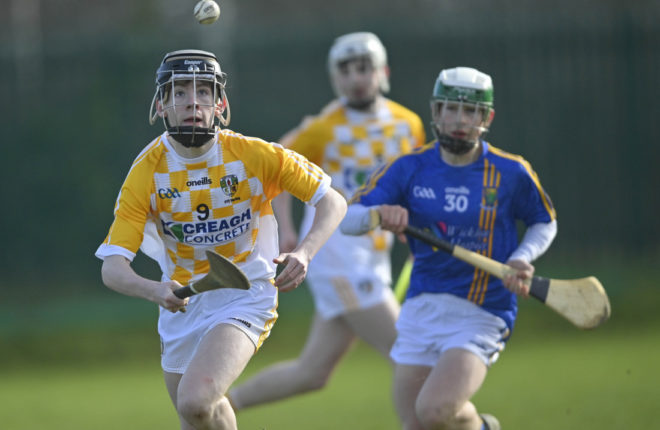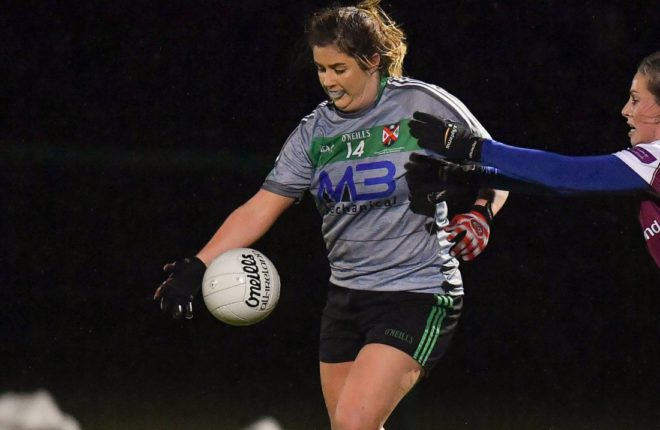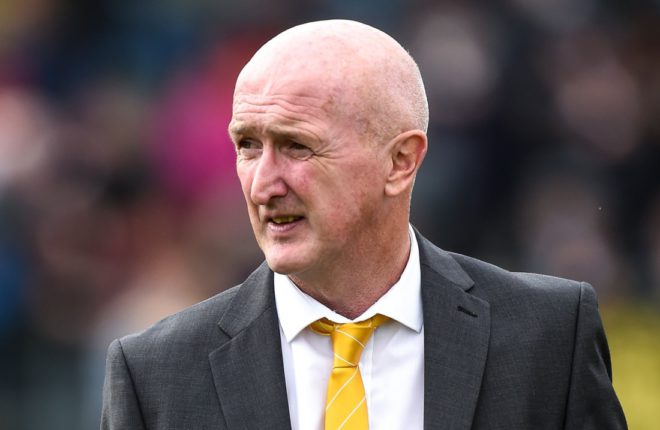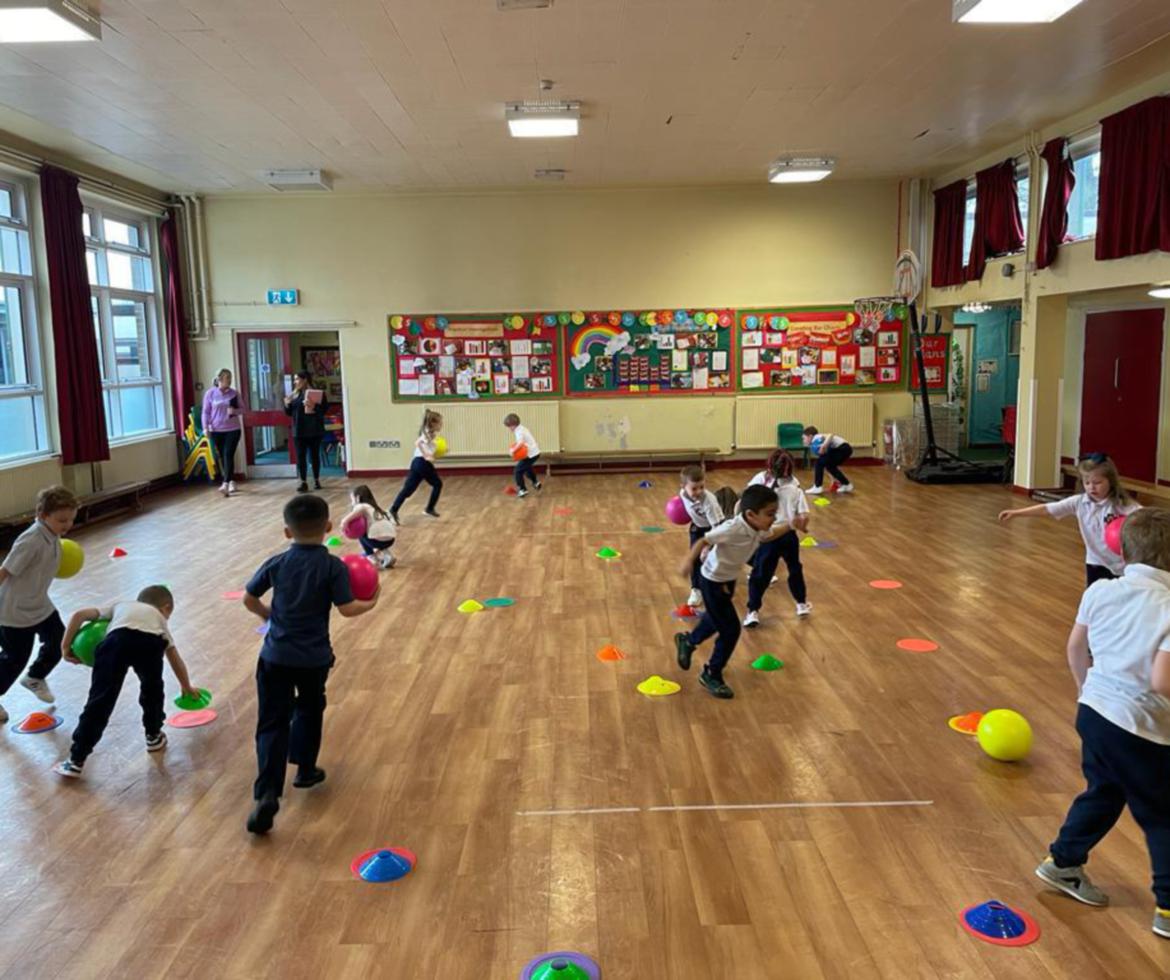Gaelfast is now back in full flow after the Covid lockdown and Michael McMullan caught up with some of the key people on the ground.
GAELFAST was a project set up to oversee a development plan for Gaelic Games in Antrim at grassroots level across the county.
The programme is under the watch of Games Development managers Alfie Hannaway and Kieran Megraw.
The ten coaches are involved primarily in primary schools, getting the groundwork started with the youngest players.
The work also includes coaching post primary, club and county underage academies, offering all four codes to over 4,600 children on a weekly basis.
Michael McMullan: What was the motivation for it all and how long has it been on the go?
Alfie Hannaway: It came down to the demand through all the schools in the area. Initially there were only three coaches working within Antrim GAA and that was to cover all the different areas.
Based on evidence based research, there was a business plan put together and they went to Ulster GAA and Croke Park. It was a ten-year plan initially, without Covid; we’ll be in the fourth year now.
It has to grow; be sustainable and link in with all the key stakeholders.
M McM: I suppose there was quite a paper trail to get all the main plans in place.
AH: There was research done into the demand s. We worked out the penetration levels from school into our clubs.
When we were working with the schools and clubs, they saw how good a job the coaches were doing and how many people we were getting into the clubs.
It was how many kids we have playing in the overall population in a school compared to what it would be.
They worked out how many coaches we’d get, so there is a plan to get 10 coaches and we are only getting back to that level now since Covid-19.
M McM: With the number of kids in the county, how is it possible to get around them?
AH: The original work programme was the Key Stage Two. The research showed that we needed to get in at a younger level, from Primary One and up. All our work now focuses on P1s in schools. In some schools, we have all classes in one day, but in the bigger schools you can only hit P2 and P3.
We still need more coaches in our areas. We are making a massive impact, we have over five thousand children being coached a week.
M McM: Is that all across the working week?
AH: That’s just us on doing our jobs. If you take into consideration, every staff member gives 15 or 20 hours to their own club, that’s phenomenal numbers we are working with across all four codes.
We cater for all abilities. We go into schools where kids have disabilities and our staff are trained up in that, to get them involved in games.
You are seeing an increase in female participation, camogie and ladies football are the fastest growing sports in Europe.
M McM: Where does the club fit into the overall picture?
AH: That’s the thing, the schools are important, but it is what they are doing in their clubs. It’s also about getting clubs to come into the schools while they (coaches) are in. That’s key, there are so many of us, but if the kids see a face coming into their school and going to the club then that is a success.
M McM: Have you based it on the Dublin model, with their club GPO (Games Promotion Officer) linked to a school?
AH: We have some areas in Belfast where we have three or four clubs feeding into one school. We are at the stage now where we need to sit down with the clubs and schools to work out what is fit for purpose and what is best practice.
M McM: I know Covid took a chunk of the initial time, but are you happy with the progress?
AH: We have got to think three, four or five years down the line, how is it sustainable. The job now is to increase our coaching numbers. Clubs have to start thinking how they can make this work for us and get more kids in.
M McM: Damien you are one of the GPOs. It seems like it’s very hands-on across the week.
Damien McCallin: Yeah, it is busy, but coming from a GAA background, it’s what we do. I remember when I started in the job thinking it was a dream job for me.
I have been involved in coaching in my own club, St John’s, and I was always a volunteer coach with the (Antrim) talent academy, the development squads in old money. I enjoyed that role.
Now, to have the capacity to have an influence on all the different levels is just brilliant. One of the things I enjoy is the variety. You are in primary schools and in at post primary level. You are also linking that into the talent academies and into your clubs.
There is so much work we could be doing, that we can only guide and influence as much as we can. I am based in West Belfast with six clubs, so I can’t spend an overly long time with one club.
Then post primary (schools), I am in two at the minute, but there are more in the area that we could be covering with more coaches.
M McM: It has often been said that Antrim need to be making an impact in the likes of the MacRory Cup to help the progression to senior.
D McC: I went to St Mary’s (Belfast) and I had a good experience there with sport at Mageean level, so I know the impact schools can have on players and teams. When you look at other counties that are doing well, often they have a good schools backing.
We offer sports in post primary as much as possible, but resources are limited compared to what we’d love to be able to do.
When I think about the staff in these schools, a lot of them are former county players. When teachers are constrained by work, that’s something we need to look at to help them out as best they can to get them out.
We have them for our talent academies one day a week, the club might have them for two hours a week but schools have them all week.
They have much more capacity to have an influence on their life. It is time well spent for the staff, so they can shave an hour off somewhere else.
M McM: Gerard, you have had a good spell with the coaching recently with Creggan winning the Championship.

TALENT POOL…Gaelfast coaches are also involved in Antrim’s talent academies. Picture: Mark Marlow
Gerard McNulty: I am only seeing it first-hand now, being in the school and being involved with Creggan. In the last five or six months, I am noticing a big change. The underage coaches are talking about the big benefit of the work being done in the school.
There are other kids not affiliated with the club, but because of the product Gaelfast is producing, kids are getting good experience and they are joining a club.
I can see that difference in Creggan, so if you multiply that by the schools we are covering. There is a definite benefit there.
Teachers are great and in rural schools, a lot of teachers are connected with a club and are enthusiastic and they are going to use it.
The kids are waiting on you; they know your name within a week and the enthusiasm. They are learning and building, it is great.
D McC: We’re the good guys, we land in for an hour and it is fun and games, The biggest yardstick is be walk in behind some of these people in a local shopping centre and there will be four year olds coming up and saying “Woody”, that’s the impact coaches can have.
G McN: It is the participation with the amount of kids now; it’s a real ‘wow factor’ for me now. I think we need another three or four members of staff to get into all schools and target that every school is linked to a club. When you go to the big school, the first thing you are going to meet is your friends who are in with clubs.
It’s linking the school with the club, their home life with the club and everything else the kids do. When it all comes together that’s your progress and it is a real long-term plan.
You have the P1s now and nobody can turn around after two or three years and ask what we are doing. You won’t see it visibly, but in five or six years’ time, you’ll see a massive benefit.”
M McM: Paul, what part of the county are you based in?
Paul Law: I am mainly in the South West. From my own club St Patrick’s Lisburn all the way around to Glenavy, there’s Aghagallon, Cargin, Moneyglass, Ahoghill, Portglenone and Glenravel.
I’d be in a lot of the smaller schools, so I can fit in a few on a day.
M McM: What differences would you notice then from your week to week programme to the others?
PL: It’s a bit like Gerard is saying with Creggan. The club-school link is very strong throughout the South West.
I would have a lot of club members coming in to help me throughout my sessions. A club knows where I am at every week and the time slot, so they can come out and give me a hand and that links into their training.
For example, their u-10 coach can come out and help me for a day and it is the same face for any new members from the school joining the club.
It also gives them more playing time, just like it’s an extra club coaching session in the week.
M McM: That’s exactly what the system was brought in for I suppose, so it must be pleasing for you.
PL: The other thing about it…is that the teachers are getting educated through our sessions and games.
They are then putting it back into their own PE sessions, so they can have two PE sessions a week.
A lot of our teachers are enthusiastic and that’s how you win them over. When they see what you can do with PE and it helps children learn their numeracy and literacy through PE.
Part of what I promote with my coaching is that it’s not all about coaching and playing the game. It is being part of the club and community. There are other non-playing roles – admin roles, statistician, refereeing with the young whistlers there are other roles in the clubs.
M McM: Fionnghuala, what is your area and what have you noticed from being involved in Gaelfast so far?
Fionnghuala Rocks: I am in Lamh Dhearg, Colin Gaels, Sarsfields and my own club – St Paul’s. Belfast is divided up among a few GPOs, so I have the four and then I am in seven primary schools.
M McM: What is the important part of planning the workload across the schools? It must take a fair bit of balancing.
FR: In one school you could be taking P1, P2 and maybe P4. Then you go to another school and it could be P5 and P6.

MAKING LEARNING FUN…Fionnghuala Rocks is one of Gaelfast’s coaches
The important issue is planning to make sure they are all getting the correct coaching for their level. It is ensuring the sessions are up to scratch and they are getting what they need.
M McM: What have you noticed from your time so far?
FR: How much the kids love sport. I walk into a school and you feel like a God. They come up; give you a hug and they are screaming your name.
The children are so keen for it, no matter what it is. If there is a ball in their hand or whether it’s running or jumping, they are so keen.
The progression across the schools and the age groups is unbelievable. You are only with for 35 or 40 minutes a week and you’ll set them a target to practice at home.
They all say they have a ball. You can tell they are doing that and it is even better when they have a club.
The amount of children who have come up to me and have said they’ve joined a GAA club for me, it’s amazing and that’s the whole idea.
M McM: Would they not have had any GAA activity then?
FR: There are a lot of boys and girls that have been exposed to soccer earlier on, so they have never really tied GAA. For me, it’s letting them discover themselves through the lesson that those skills can be transferred.
There is a guy in one of the schools and he came up to tell me that he had joined a GAA club. He is unbelievable and you are itching for him to be playing for a GAA club, but it’s something they have never really thought of.
M McM: Is it hard to sell it across then in some cases?
FR: We’ll have leaflets of the clubs around with the training times so they can link up with a club.
With the resources we have and with the fun games we are bringing to the lesson, you are not really doing much selling.
They are enjoying it and going home with a great impression. They’re coming back and saying “Fionnghuala are we playing that game from last week” or I’ll continue the score from the previous week and there is a competitive element to it.
M McM: I supposed if they didn’t enjoy it, they wouldn’t come back.
FR: That’s 100 per cent right, if it’s fun they always want more.
M McM: Dominic, is most of your remit in hurling across North Antrim then?
Dominic McKinley: I have all the clubs to look after up there. In most of my schools, 85 per cent of them have a penetration rate within their clubs.
My job is to create and get another 10 per cent out of each club. I am also helping the second and third tier clubs become stronger and better.
Glenarm are a prime example. It is all about setting up the structure. They had 12 or 14 children within the club. It had it up to 78 inside a few years with hard work.
The camogie club have over 120 children and started with 12 or 14, but it was because of people with vision and doing the work.
M McM: Is that more than you expected?
D McK: People always want to fast-track it, but there is no way of fact-tracking it…it is about people wanting to genuinely care about the club and set up a structure.
It has to happen with the vision of the three or a five-year plan. We can help them make it happen but we can’t do it for them.
We tell them the structures of what they need to do and tell them you can help out in the school. You have to encourage them to put people in the school.
M McM: Is that getting a club to put in their own GPO, where does the money come from for something like that?
D McK: Glenarm put their own coach in the school. People will say there is no money; they are a very small club and have their own coaching going into the school…Carnlough are the same.
The clubs fund it themselves. They see the benefit of me being in the school. Someone in the club would be going to college and need a bob or two. They’d have the expertise as part of the programme, so you could give them £40 or £50 a day to go into a school and they’ll reap the benefits of it.
M McM: Would a dedicated coach then be the way forward for all the clubs?
D McK: I wouldn’t go mad with the coaching in the school. If they are not enjoying it, then it won’t work. It’s about getting a balance and trying to connect with the children.
Have a bit of craic and it’s time to practice. You can set fun targets like throwing a ball against a wall five times in 10 seconds and you’ll find they’ll all want to see how they get on.
Everything has to have a fun target, nothing serious like winning a match, and you can see the benefits of that in the schools.

FORMER GREAT…Dominic McKinley is tasked with helping participation on North Antrim
The most important thing is having a coach that can connect.
The environment is key to underage, if you start a season with 24 players and you have 25, then that’s success. If you start with 24 and you are down to 15, you need to take a long hard look at yourself.
M McM: What would the overall success of Gaelfast look like?
D McK: The post primary schools are key. It’s something we’d like to try to bring up, promote them better and get at them better.
There are a lot of good teachers with GAA backgrounds trying to promote it to the best of their ability and it’s about us trying to help them.
The Mageean is a very important competition. I know the children that train for those competitions that don’t train for their clubs the same way.
If we can raise the standard it’ll help Antrim and in a football sense it is something that needs to improve big time.
G McN: The biggest impact comes at the youngest age. We can see that in primary one classes after two weeks. When they get older, that impact takes a bit longer. In post primary, we need to build up a head of steam in first year and second year.
AH: It’s still in the early stages. It’s going to be long term, it’s about getting them in primary schools and then into the talent academies, then their athletic development so when they get to minor and u-20 you have a conveyor belt.
We are starting a programme next year with the post primary, providing them with three times the game opportunities they’d usually have and it is developing a link with Ulster Schools who are doing great work.
We are not competing at the higher levels of post primary competitions. We have strong clubs and academy squads, but throughout the year in our school competitions, we don’t seem to be able to get players out and operating as effectively as they have done in the past.
That’s because there is pressure on the teachers, hopefully our staff in tandem with clubs assisting in the schools, we can bring them on a level.
The appetite is there and the feedback coming back from the schools that we can help them bring it to another level. The appetite is there, the feedback coming back from the schools is they want this programme.
If there are more kids playing in primary school, there will be more kids at post primary coming through the academies.
Receive quality journalism wherever you are, on any device. Keep up to date from the comfort of your own home with a digital subscription.
Any time | Any place | Anywhere












